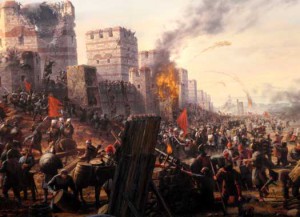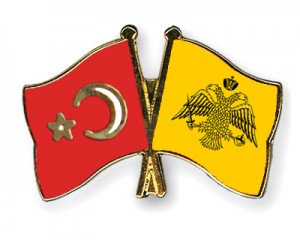 Jodi asks where the Turkish people originated from and how they ended up invading the Byzantine empire. The Turks are relative newcomers to Anatolia. They are part of a much larger linguistic group called ‘Turkic peoples’. This would include the Bulgars, Avars, Uyghurs, Uzbeks, Petcheneges, and possibly Huns among many others. They all seem to have originated in Central Asia, probably near the Altay mountain range where modern Russia, China, Mongolia, and Kazakhstan meet.
Jodi asks where the Turkish people originated from and how they ended up invading the Byzantine empire. The Turks are relative newcomers to Anatolia. They are part of a much larger linguistic group called ‘Turkic peoples’. This would include the Bulgars, Avars, Uyghurs, Uzbeks, Petcheneges, and possibly Huns among many others. They all seem to have originated in Central Asia, probably near the Altay mountain range where modern Russia, China, Mongolia, and Kazakhstan meet.
The Seljuk Turks started to migrate west as early as the 6th century AD, but the main exodus took place in the 11th century when they were pushed by the Mongols. In 1071 they crossed Byzantine territory (Armenia) on their way to Egypt when the imperial army under Emperor Romanus Diogenes confronted them at Manzikert. The resulting three day battle was an almost unparalleled disaster for Byzantium. The army was destroyed and Romanus himself was captured. Even worse, the Seljuks (who had previously contented themselves with raiding) flooded into Anatolia, permanently wrenching it from Constantinople. The Seljuk empire, however, didn’t hold together for long. In 1299 a young Turk by the name of Osman broke free from the collapsing Seljuks and founded his own state which was named Ottoman in his honor.
By 1461 the Ottomans had absorbed the last remnants of Byzantium and had pushed deep into Eastern Europe. Their empire would last until the end of the First World War, at which time it was largely carved up by the Great Powers. The areas where the Ottomans were ethnically dominant (more or less) became the the borders of modern Turkey.
 Joost asks when exactly Turkey became Turkish. Or to put it another way, when did Byzantine (Greek) culture vanish from Asia Minor?
Joost asks when exactly Turkey became Turkish. Or to put it another way, when did Byzantine (Greek) culture vanish from Asia Minor?
It’s hard to emphasize just how deeply Hellenic roots run in Anatolia. Ionian settlers reached the western coast of Turkey as early as the 9th Century BC and made up a sort of Magna Graecia in Asia. Some of the most famous names in Greek history and mythology are associated with this area in what is now Turkey. Homer was supposedly born in Smyrna (Izmir), Herodotus was born in Halicarnassus (Bodrum), and Jason’s pursuit of the Golden Fleece took place on the Turkish coast of the Black Sea. These Ionian cities were instrumental in sparking the Persian Wars which ultimately resulted in Alexander the Great welding everything between the Balkans and India into a massive Hellenistic state. In 133 BC king Attalus of Pergamum (one of the last splinter kingdoms of Alexander’s empire) willed his territory to Rome and Anatolia entered the Roman Empire. It stayed in imperial hands from the 2nd century BC till the 11th AD without a serious break. In 1071, when the Byzantine army suffered a catastrophic defeat at Manzikert, parts of Asia Minor had been Greek for nearly two thousand years.
The most Hellenized regions were the coasts, and Byzantium recovered enough to retain control of them but the interior was officially abandoned. Once it was clear that the Crusades wouldn’t change the situation, the emperor Alexius Comnenus agreed to a treaty with the Seljuks allowing Christians to peacefully emigrate to imperial territory. This ensured the effective end of the Greek presence in the interior and its ultimate Turkification and Islamification.
The change, however, was relatively gradual- a slow eroding over the centuries. The Muslim authorities in Asia Minor referred to the Greek population as ‘the emperor’s church’ and as late as the fifteenth century were afraid that it would act as a fifth column in a Byzantine counterattack. Thriving Greek communities with their own schools, churches, and customs dating back to when Xenophon was marching ‘up country’ remained in place throughout the Ottoman Empire. What finally extinguished them was the great population exchange of 1923. Half a million Turks who had settled in Greece during Ottoman times were relocated to Turkey, and in exchange 1.5 million Greeks from Asia were transplanted in Greece. (Many of the homes they inhabited are still ghost towns today as the Turks refuse to live in them). We are in the very end stages of the complete disappearance of Greek traces from one of its ancient heartlands.
Istanbul was still a cosmopolitan city because it was exempted from the exchange, but in 1955 there were terrible racial pogroms that drove most of the Greeks away. In 1924 there were 200,000 Greeks living in the city and the last time a census was attempted (2006) there were barely 2,500. (Interestingly enough the opposite is true in Greece. The Turkish population of Thrace has had a growth rate of about 2.8% since 1951)
There is still one remnant holding on though. They are a group of ethnic Greeks living on the Black Sea coast near the Byzantine city of Trebizond. As Muslims they were exempted from the population exchange and they still speak an archaic form of Greek. It has the structure and grammar of medieval Greek- in other words it’s the one place on earth you can still hear the language of fourteenth century Byzantium. Ben Atlas provided a youtube clip: http://www.youtube.com/watch?v=UcAYP4irSyQ
 Jodi asks where the Turkish people originated from and how they ended up invading the Byzantine empire. The Turks are relative newcomers to Anatolia. They are part of a much larger linguistic group called ‘Turkic peoples’. This would include the Bulgars, Avars, Uyghurs, Uzbeks, Petcheneges, and possibly Huns among many others. They all seem to have originated in Central Asia, probably near the Altay mountain range where modern Russia, China, Mongolia, and Kazakhstan meet.
Jodi asks where the Turkish people originated from and how they ended up invading the Byzantine empire. The Turks are relative newcomers to Anatolia. They are part of a much larger linguistic group called ‘Turkic peoples’. This would include the Bulgars, Avars, Uyghurs, Uzbeks, Petcheneges, and possibly Huns among many others. They all seem to have originated in Central Asia, probably near the Altay mountain range where modern Russia, China, Mongolia, and Kazakhstan meet.